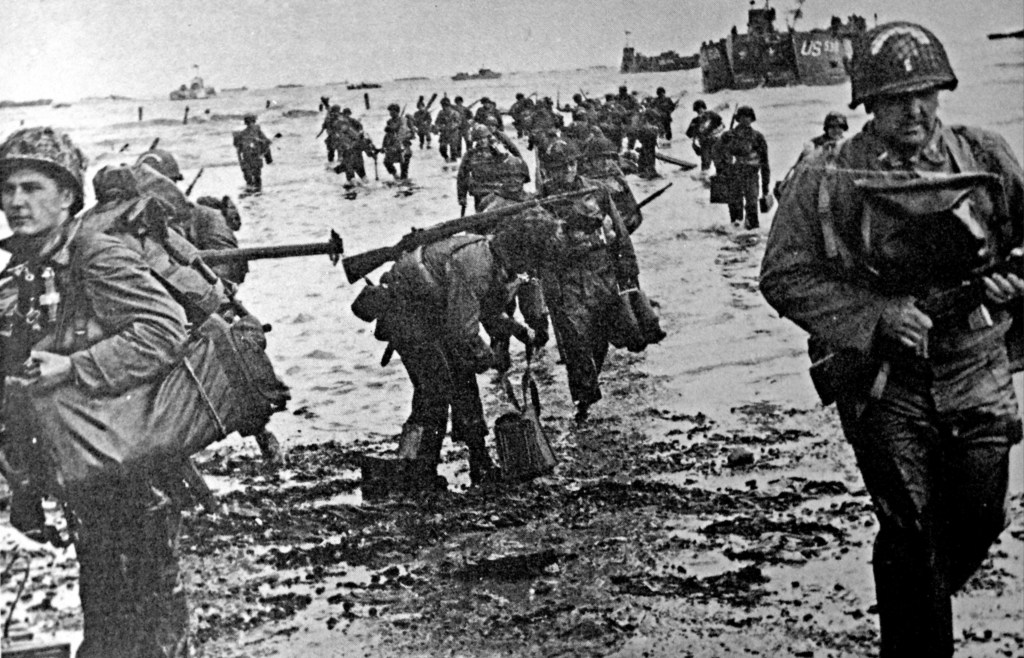Eighty-one years ago today the combined forces of the United States, Great Britain, Canada, the Free French, and several other countries of the Allied coalition parachuted onto drop zones and landed on beaches across Normandy, starting the offensive to liberate Europe from Nazi occupation. The largest amphibious operation in military history and, at the time, the largest airborne infiltration, Operation Overlord represented an audacious step to defeat the German war machine.
The United States had at that point been at war for two and a half years since the attack on Pearl Harbor. Some of that time had been marked by slow build-up and industrial refocus, some had been marked by initial failures, such as the Battle of Kasserine Pass and the fall of the Philippines, and some had been marked by hard fought victories such as the Battle of Guadalcanal. But all of it had required rallying the American public for the sacrifices that would be borne, both by those in uniform and on the homefront, for the ultimate victory in a righteous cause. To assist in this effort, acclaimed filmmaker Frank Capra made a seven-part documentary series, Why We Fight. These films, drawing on Capra’s masterful storytelling and ability to strike a resonant emotional chord with the American public, were meant to address the specific question as to why America was fighting the joint evil of Nazi Germany and imperial Japan.
But in the intervening years, we’ve seen a shift from many Americans: Some don’t want an answer to the question of why countries might fight specific conflicts, and instead raise more fundamental questions: Why fight at all? Is anything worth fighting for?
There has always been a portion of humanity that held the naive but well-intentioned belief that mankind could evolve past the need for armed conflict and live in peace, but this rejection of the utility of and need for force—or at a minimum the recognition that others will continue to use force against us—took hold among the American left during the Vietnam War and has festered. More recently, many on the American right have been engaged in rhetoric—right down to accusing anyone who sees the need for a strong defense as being bloodthirsty or war profiteers—that sounds like it could have been borrowed from the Port Huron statement.
War is inherently horrible and should be avoided if at all possible. War releases the destructive force of state and non-state actors, brings out the worst in man, and, even in the most virtuous of causes, results in the deaths and mutilation of countless innocents. Nobody, not even the victor, walks away from a war unscathed. Even the war which we mark today, the war to defeat Nazi imperialism and to end the Holocaust—arguably the most noble cause for which men have fought—still resulted in the deaths of millions of civilians on both sides.
But despite its horrible nature, war remains an enduring reality of human existence, as we are reminded in a quote largely attributed to Trotsky: “You may not be interested in war, but war is interested in you.” Over two millennia ago, Thucydides wrote that nations go to war for “fear, honor, or interest,” and, as much as we might like to think differently, we have not evolved biologically from the humans who went to war in his day—for all of the technological advances that give us greater access to information, the brains that process and decide how to act on it remain the same. Despite the enduring idea that each generation might be the one to advance past war and achieve some sort of global communion, the stark and ugly truth is that there will always be conditions and competition between humans that are so unacceptable, resolving them through force becomes necessary.
Ultimately, wars are entered into to achieve an end state, a preferred outcome to the underlying tension that resulted in the conflict. Usually, these wars do not end until one side has compelled the other to accept their desired end state, as the United States did versus the Nazis, Japanese, or Confederates, or until one side is unwilling to continue the conflict and agrees to a cessation, as with the British in the American Revolution and as we ourselves did in Vietnam. In some cases, these conflicts are purely practical—a competition for resources or access. In some cases, the decision to engage in warfare is entered into hastily, either through misunderstanding of what is at stake or through miscalculation of the difficulty and cost. But neither of these realities change the fact that many conflicts are fought for the most fundamental of reasons—for freedom, sovereignty, or to defend the lives and property of citizens.
This misunderstanding as to the necessity for conflict, and why nations fight, creates advocacy for bad policy. In the aftermath of October 7, there were many—primarily on the left—who demanded Israel engage in immediate ceasefire, regardless of the facts that hundreds of hostages remained in captivity and that the terror organization masquerading as a semi-autonomous government that had just slaughtered more than 1,000 Jews remained in power in Gaza. On the right, there are many, including inside the current administration, who cannot comprehend why Ukraine fights for its sovereignty and independence and advocate for a concession to Russian demands. Both of these calls for a cessation of conflict discount the conditions that rendered the conflict necessary. Regarding Gaza, after two decades of trying to live with Hamas in an official governing status, Israel would be foolish to allow its citizens to remain in captivity or to allow Hamas, who has not changed its stated purpose to eradicate Israel and Israelis, to regroup until the next October 7. In Ukraine, Volodymyr Zelensky’s forces are fighting for the very existence of their country. Those who criticize Ukraine for fighting wave away the fact that without that fierce resistance Ukraine would cease to exist—absorbed yet again by the malign neighbor who has oppressed it in the past—to say nothing of the fact that Russia has kidnapped thousands of Ukrainian children and continues to oppress Ukrainian citizens under military occupation.
So as we mark the anniversary of so many young American, British, and Canadian boys landing to defeat the forces trying to eradicate the Jewish people, and of the Free French, Polish, Dutch, Czechs and others charging forth to fight for the sovereignty of their homelands, we should remember that today there are militaries fighting to defeat those who would murder Jews and for the sovereignty of their homeland, and that these causes, as they were 81 years ago, remain worthy and right.
We should never forget that, as much as we might wish otherwise, there will always be causes that require war to achieve justice and stability. There will always be forces of oppression and evil that must be countered through force. And this, as unpleasant as it is, is why humans fight. American leaders should eschew populist wishful thinking and rhetoric that pretends these realities do not endure and, instead, communicate to the American people that some things are worth fighting for, that we will back our friends and allies as they fight for these virtuous causes, and that America will stand against the forces of evil and disruption. Anything less is a betrayal of those who have gone before, who sacrificed to keep the barbarians beyond the gates—like those young men 81 years ago.







Please note that we at The Dispatch hold ourselves, our work, and our commenters to a higher standard than other places on the internet. We welcome comments that foster genuine debate or discussion—including comments critical of us or our work—but responses that include ad hominem attacks on fellow Dispatch members or are intended to stoke fear and anger may be moderated.
With your membership, you only have the ability to comment on The Morning Dispatch articles. Consider upgrading to join the conversation everywhere.